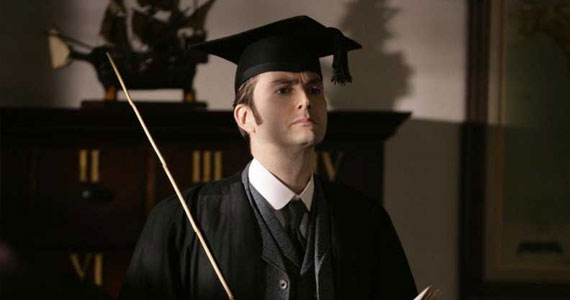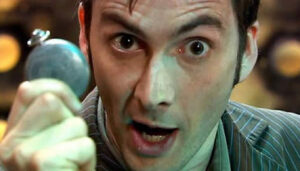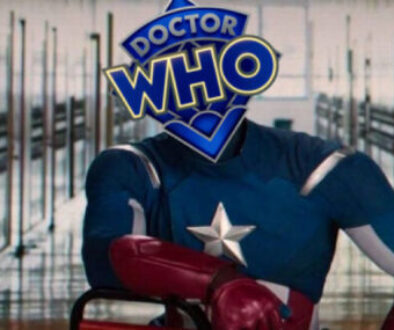Human Nature / The Family of Blood in Perspective
David Selby takes another look at Paul Cornell’s two-parter from Series 3.

“Have you enjoyed it, Doctor? Being human? Has it taught you wonderful things? Has it made you better? Richer? Wiser?” – Son of Mine
Human Nature/The Family of Blood is a highly unique story. It tells the tragic tale of John Smith, the Doctor’s human alter-ego, with no knowledge of his counterpart; hiding (unknowingly) in a pre-war England to escape from the ghastly Family of Blood – alien hunters who want to become immortal using Time Lord biology. The 2007 TV story is in fact based on a novel in 1995 (also called Human Nature, also written by Paul Cornell). The novel and TV story alike have often been referred to as two (or arguably one) of the great Doctor Who stories.
In this article, I will look at Human Nature/The Family of Blood; at the themes it uses and the messages it conveys, and explain why it is such a masterpiece.
“I dream I’m this adventurer. This daredevil, a madman. The Doctor, I’m called. And last night, I dreamt that you were there. As my companion.”
 The premise of Human Nature was simple: to introduce John Smith, a normal school teacher in 1913, who is, in fact, the Doctor, but in human form. Curiously, the Doctor has retained vague recollections of his most memorable days in dream-form, recording all he can recall in his book, ‘The Journal of Impossible Things’ (an ironic title, given that Smith himself is a fabrication). Whilst the Doctor has had a least one dream featuring Martha as a companion, the most prominent character in Smith’s vivid visions is Rose – an allusion to the fact that she is still playing on the Doctor’s mind and that he does undeniably miss her a lot. Joan states that he, “sometimes think[s] how magical life would be if stories like this were true” – the Doctor, on the other hand, has become so accustomed to a life of wonders that he seldom considers how wonderful a life he leads.
The premise of Human Nature was simple: to introduce John Smith, a normal school teacher in 1913, who is, in fact, the Doctor, but in human form. Curiously, the Doctor has retained vague recollections of his most memorable days in dream-form, recording all he can recall in his book, ‘The Journal of Impossible Things’ (an ironic title, given that Smith himself is a fabrication). Whilst the Doctor has had a least one dream featuring Martha as a companion, the most prominent character in Smith’s vivid visions is Rose – an allusion to the fact that she is still playing on the Doctor’s mind and that he does undeniably miss her a lot. Joan states that he, “sometimes think[s] how magical life would be if stories like this were true” – the Doctor, on the other hand, has become so accustomed to a life of wonders that he seldom considers how wonderful a life he leads.
John Smith is a ‘man of the time’, so to speak. He’s not a bad man by a long stretch, but neither does challenging some of the injustices of patriotism come easily to him. Unlike the Doctor, he’s content to resort to violence or exalt war – but, conversely, is blessed with human virtues and/or burdens, such as falling in love or knowing that his aspirations will only ever stay as reveries. The Doctor is, as Joan suggests herself, the man John would like to be – “doing impossible things with cricket balls”. John later becomes aware, however, of the encumbrances and misfortunes of being a Time Lord, and discovers that being human is far more of a godsend.
I adore John Smith’s characterization. The notion that it’s like he’s “left the kettle on, like he knows he has something to get back to, but he can’t remember what” is almost haunting with its implications.
Observant fans will also have realised the relevance of Sydney and Verity as his parents – a homage to the show’s roots.
“Mankind doesn’t need warfare and bloodshed to prove itself. Everyday life can provide honour and valour. Let’s hope that from now on this country can find its heroes in smaller places. In the most ordinary of deeds.”
It seems appropriate that, because Human Nature precedes one of Britain’s most reprehensible eras, there is at least some awareness of what happened in the war (or, from their perspective, what was yet to happen).
The story made an effort not just to subtly foreshadow how many lives would be lost (Martha remarking that boys like that might not be running the world in a few years’ time, for obvious reasons), but also to convey that there is almost always another way out than violence. Indeed, being kind and trying to avoid the circumstance of judging others is the central theme to The Family of Blood, and the Doctor’s core motive for becoming human (it also seems fitting in a time when Christianity was arguably more influential than it is today, the message of not judging and trying to keep peace should be pushed so heavily). It’s tragically true that before the war, battle was overvalued (as Son of Mine comments: will the boys thank the men who taught them war was glorious?). The ‘Great’ War marked a day when violence was suddenly disapproved. The final scenes of The Family of Blood, moving from the perilous trenches to a memorial service are all moving tributes to the events of World War One (the use of John Smith for the narration is also a resourceful addition, as we can envisage him as a history teacher in the present day).
“We are the Family of Blood”
 A lot of great Doctor Who stories are so filled up with their eloquent poetry and intricate plotlines that they ‘throw in’ an adversary at the last minute (whilst I’m loathed to criticize The Caves of Androzani, that cave monster was hardly a necessary addition to the narrative). The Family, on the other hand, were a riveting antagonist, and one of Doctor Who’s most truly underrated baddies.
A lot of great Doctor Who stories are so filled up with their eloquent poetry and intricate plotlines that they ‘throw in’ an adversary at the last minute (whilst I’m loathed to criticize The Caves of Androzani, that cave monster was hardly a necessary addition to the narrative). The Family, on the other hand, were a riveting antagonist, and one of Doctor Who’s most truly underrated baddies.
Perchance the word ‘Family’ may be meant in a more metaphorical sense – of Blood also implying that they are the same blood, or the same ‘essence’, as it were. I personally like to think that the Family of Blood is one malevolent entity, able to split itself into manifold corporeal forms (take Scaroth as a classic example of this concept). Mother, Son, Brother, etc. are all positively alien interpretations of the Earth terms of address.
The Family of Blood are callous. They’re merciless, sadistic and only care for their own survival. An example of this is their abduction of Lucy Cartwright (an action which isn’t forgotten in The Family of Blood when Smith, Redfern and Jones take refuge in her house, observing that her parents will have also been affected) – an unwarranted and cold exploit. The Family, together, make for a bizarre presence; a refreshing change from the somewhat clichéd norm.
“I’m not… I’m John Smith. That’s all I want to be. John Smith. With his life and his job. And his love. Why can’t I be John Smith? Isn’t he a good man?”

Human Nature/The Family of Blood deals with two contrasting themes: being human and being a Time Lord. Cornell uses his awareness of personal perspective to alter our understanding, and, progressively, our compassion towards the Doctor. Nurse Redfern’s question, “if the Doctor had never visited us, never chosen this place—on a whim—would anyone have died?” was debatably not a pivotal inclusion, but was, for me, the most thought-provoking line within the entire story, because it applies not only to Human Nature, but also to numerous, if not all other Doctor Who stories. “He was braver than you, in the end,” says Nurse Redfern – and she’s quite right too.
Contrary to the above, however, the biggest twist was that the Doctor was, in fact, being kind, yet it was his benevolence that led to the Family’s horrific demises. The scene in which the Doctor carries out his own methods of justice is both disturbing and powerful; demonstrating the Doctor’s basest capabilities.
Human Nature is, not surprisingly, about human nature, and actually has a lot to say on the topic. A lot of it is about humanity’s uniqueness; how things the Time Lord wouldn’t even consider (such as falling in love, or not being willing to change) become John Smith’s defining traits. Smith and Redfern’s relationship is both believable and heartfelt, accompanied by a mesmeric soundtrack from Murray Gold and acted effortlessly. The beautifully-directed scene wherein Smith and Joan watch their perfect life play out is the episode’s pinnacle and always manages to elicit pathos. Murray Gold’s song title, ‘The Dream of a Normal Death’, is surprisingly telling in terms of the context.
I have some theories regarding what became of the Family – and, interestingly, Cornell has left a lot of the comeuppances open for interpretation. For instance; I like to imagine that the TARDIS has trapped Daughter of Mine in another dimension (which is why, as with The Curse of the Black Spot, she can only be seen in reflections). She would be alone is this shadowy element; a little girl’s nightmare. Relating back to my earlier suggestion that the Family are one entity, the Doctor may be causing them unimaginable pain by breaking up the separate parts (as an example of this idea, take intercession in Phillip Pullman’s His Dark Materials – essentially tearing off one’s conscience).
The Family of Blood’s climax is an enthralling scene, and, like the rest of the episode, moves from funny to suspenseful to unusual to challenging to heart-breaking in seconds and demonstrates some of the best writing Doctor Who has ever seen. Human Nature/The Family of Blood doesn’t just have a unique concept; the delivery outdoes the idea, not to mention paving the way for the rest of the series. I’m proud to say that, at the moment, The Family of Blood is my favourite ever Doctor Who story.








